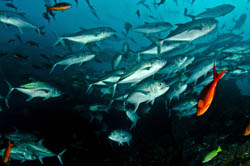Knowledge flow on marine preservation
Climate change and intensive fishing practices are having an enormous impact on the marine environment. Formulating effective and timely responses and interventions requires in-depth understanding of the magnitude of the problem and the dynamic processes at play. There is also a need for models that can forecast what will happen under various scenarios. Financed by the Seventh Framework Programme (FP7), the MESOMED initiative sought to bring about a better understanding of the marine environment, particularly the north-western Mediterranean. Researchers investigated the distribution and production rates of biota, and predictive models for future changes. MESOMED sought to deepen understanding of the transport and population dynamics of zooplankton and fish larvae in the Gulf of Lions (GoL). It developed three sensor packages: an integrated laser optical plankton counter fluorometer (which measures fluorescence), an integrated towed Acrobat platform fluorometer, and an integrated laser in situ scattering and transmissometery fluorometer. The measuring devices were deployed in three locations: at a station in the bay of Marseille, on a ship cruising the GoL in the Mediterranean, and on another vessel in Antarctica. Project partners also developed a number of models, including ecosystem-sized spectrum models for optical plankton counters, a growth rate model for zooplankton and a plankton trophic dynamics model. The project will not only further understanding of how human activity affects marine life, it will also enhance the capacity and capability scientists to conduct multidisciplinary, large-scale surveys.







